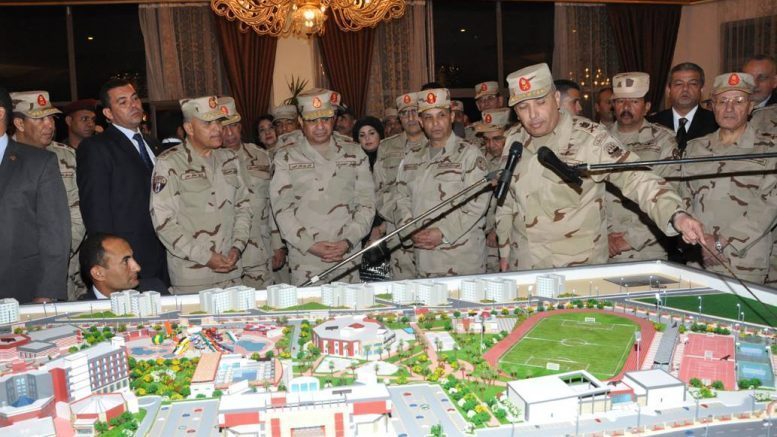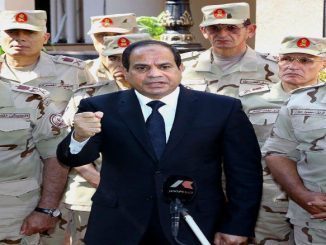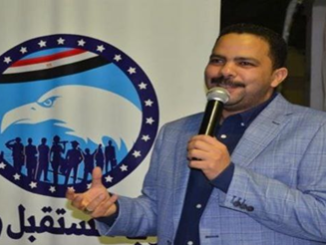
The Egyptian Armed Forces has always been referred to as the “black box” related to its unsupervised budget that makes it impossible to track its revenues and profits. However, what can be easily tracked is the the Egyptian Armed Forces’ well-known penetration of the economic activities, which almost replaced the role of the civil institutions.
Several reports were regularly released stating that the Egyptian Army or its related entities have signed treaties with other countries.
One of those, the Ministry of Military Production signed a memorandum of understanding with China to establish a solar panels factory. In the same context, Gen. Mohamed al-Assar, the Minister of Military Production, met with the Russian Minister of Commerce and Industry to discuss the possible cooperation in civil and military production. In addition, the Head of the Arab Organization for Industrialization received the Kenyan artillery chief to negotiate the possible cooperation between both parties.
A week ago, the Egyptian Ministry of Supply gave away its responsibility in managing the subsidy card system to the Ministry of Military Production, and the Awkaf (Religious Endowment) Ministry’s authorization of the Ministry of Military Production to sell 10,000 acres of land related to Al-Awkaf to investors, which ensures the accusations raised against the military institution that it seeks to fully control all the economic and civil activities in Egypt.
The recent roles dominated by the Ministry of Military Production are added to other projects that have been dominated by the military such as automating the agriculture property documentation and a contract for constructing a new building for the Lawyers Syndicate which is consistent with the military institution’s penetration of the Egyptian politics and economy in general.
The military also dominated the political positions, starting from the presidency that was usurped by Abdel Fattah al-Sisi, who led a military coup that brought him to power, as well as a large number of ministers with a military background (a number of army generals appointed as ministers, not necessarily military-related ministries).
Among these areas penetrated by the military were the administration of governorates (provinces), districts, universities, research centers, the national institutes, the consumer’s protection associations, sports stadiums, public hospitals and foreign schools (schools teaching foreign curricula such as the American, British and Canadian diplomas), the boards of directors in holding companies and the oil and natural gas sectors and others.
In March 2014, the Washington Post said that the Egyptian Armed Forces control nearly 60% of the Egyptian economy pointing that the revenues of these projects aren’t announced to the Egyptian public.
Al-Sisi Claims Military Role Is Only Administrative!
In the second part of his interview with editors-in-chief of state-owned newspapers, when Abdel Fattah Al-Sisi was asked about the role of the Armed Forces in the mega projects and whether this will affect the activity of public and private companies, Al-Sisi said that “the army’s men are not construction workers. They are fighters. The role of the Armed Forces in these projects is administrative… It administers work according to a specific timeline with the aim of achieving the best quality in minimal timing.”
Al-Sisi added that the army observes the work of private companies to make sure it is up to Egypt’s standards.
He also talked about the army’s role in policing prices of goods and providing food products at reduced prices to the public. However, the Armed Forces’ foodstuff products range from meats and poultry to other consumer products, and are sold in squares and supermarkets; but, its expenses and profits are unknown to the public.
In the same context, al-Sisi, the former Defense Minister, said that the army’s cut from the state’s budget constitutes 2% to 2.5%, “which is the lowest in the region”. However, no one can investigate the truth of al-Sisi’s claims as the army’s budget as a whole remains unsupervised by the Egyptian public, legislative apparatus, and civil society.
The Egyptian Military and Mega Projects
Since the military coup in 2013, the Egyptian Army has carried out various mega projects in Egypt, reported Daily News Egypt.
The Egyptian Armed Forces controls the infrastructure of the country and land ownership. In February 2014, the Egyptian arm of UAE’s construction company Emaar Misr announced that it paid EGP 72m to the armed forces to “modify the conditions of the units affiliated to the armed forces in the Uptown Cairo project area”.
The company also spent EGP 60m to construct alternative military facilities in return for using the western part of the land of Uptown Cairo. In order for Emaar Misr to continue working on the project, it had to sign a cooperation protocol with the Ministers of Defence, Investment and Local Development.
In addition, the Egyptian military owns companies in different fields with around 2 million personnel, such as cement, fertilizers, televisions, refrigerators and foodstuff. The Egyptian army owns hospitals, hotels, clubs and child-care centers.
Moreover, the armed forces re-entered the scene in 2011 when it rebuilt a church in Etfeeh village in Upper Egypt that was burnt down in a sectarian attack in March of that year.
The armed forces constructed two vital roads, the ring road and the Cairo-Sokhna road, in addition to developing the Cairo-Ismailia road and the Cairo-Suez road. The toll gates also on these roads came under the administration of the army-run National Railways Company. It also built eight bridges in different governorates, and three axes.
Moreover, the military has constructed an airport in the Sohag governorate in Upper Egypt and a port in Hurghada.
With regard to sports projects, the armed forces developed stadiums and sports clubs. It also built several hospitals and government-owned clubs, educational institutions and tourist spots.
Threats from the Egyptian Army’s Hegemony
The spread of corruption is one of the major threats of the military unsupervised economic expansion in Egypt’s economy. According to a spokesman for Transparency International cited by Middle East Eye, “There is evidence to suggest that some military officers, across all ranks, own their own enterprises and benefit significantly from the use of public infrastructure and facilities to increase profits.
Furthermore, a network of military retirees either presides over or supervises government commercial enterprises and facilities, or participates in consultancy contracts. This practice may extend to forming private companies to capture subcontracts,” reported MEE.
In addition, Ridha Hajjaj, a professor of urban planning at Cairo University, who argued that it risks returning Egypt to conditions from before the 1952 revolution, when corruption in the army was widespread.
“There is a fear that members of the army will get accustomed to civil life and its luxuries, especially since many in the armed forces have taken advantage of nepotism to join the armed forces’ civilian companies,” he said. “What is more dangerous is that some of the officers have started establishing subcontracting companies to administer army projects, which means there is no fair competition for private companies.”
Hajjaj also estimated that the army’s administration of the desert roads means that it will control two-thirds of the Egyptian economy, instead of only a third. Egypt, he said, has effectively become a military state, where private companies and individuals need the army’s approval to make deals.



